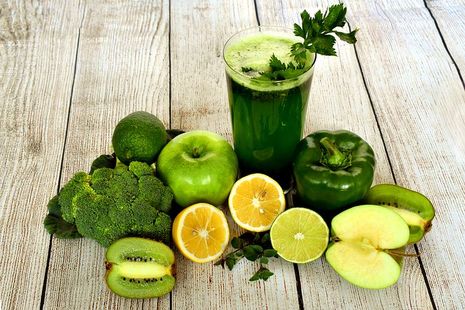Five myths about the ‘runner’s diet’: why living off lentils might not work
Amid endless debate as to what really is the ‘correct’ way, Edward Cator explores five myths that he believes block a healthy runner’s diet.

Many people who want to get into running are put off by the daunting prospect of painstakingly counting out individual grains of rice or choking down vile protein shakes. There is certainly no shortage of books explaining ‘exactly’ which foods you simply must eat to maximise your performance, and no lack of tanned, toned, flat-tummed individuals smiling magnanimously from the cover in the safe knowledge of their own unassailable superiority. You know the ones I mean.
Books with such inspiring titles as “This Is Going To Hurt”, “Willpower Doesn’t Work” and “Skinny B*tch” (all real names) make a running lifestyle seem exclusively achievable to those who do 5am 10-mile cross-country runs with rucksacks full of rocks, and then eat the rocks for breakfast. As someone who calls themselves a runner, and also as someone whose eating habits single-handedly keep Terry’s Chocolate Oranges in business, I can tell you this simply isn’t true. And so, without further ado, here are my Top Five Myths about the so-called ‘runner’s diet’.
1. Different people need different types of diet
Everyone is different. We all have that annoying friend who eats like a pig but looks (and runs) like a gazelle. However, as Micaela Karlsen points out, many people confuse differences in degree with differences in direction. What this means is that, whilst some people may have a lower tolerance to unhealthy food, they don’t therefore need to follow a vegan diet, or a keto diet, or a sugar-free diet because “it’s the only thing that works for them.” All human digestive systems are fundamentally the same, and so eating generally healthy, balanced food will always win out over a wild goose chase for your perfect nutrition programme. Unfortunately, that also means there’s no-one out there who will thrive off the McDiet…
“Eating generally healthy, balanced food will always win out over a wild goose chase for your perfect nutrition programme.”
2. Your diet has to be precise
Food packaging labels outline each individual calorie, adding a second to our parkrun time and pushing us ever closer to our unavoidable demise. It’s easy to become obsessed with the exactitudes of weekly mileage, km splits and PBs - it seems natural that this precision should also transfer to what we eat. However, the reality is that a far more rough-and-ready approach works just as well. In 2006, 20,000-year-old human footprints were found to be running for several miles at a breezy 37 kph – Usain Bolt’s top speed. There is a lesson to be learned here: our ancestors certainly didn’t worry about exactly what they were consuming. It’s far healthier to have a common sense attitude about what you eat; listen when your body is telling you it’s hungry or full, and not beat yourself up for that extra slice of cake.
3. You need processed food
A common misconception is that expensive, fancy runner-y bars are an essential part of one’s daily food intake. Some runners think it’s necessary to squeeze every possible microgram of sustenance out of each bite: the nutritional equivalent of Dwayne Johnson with a used-up tube of toothpaste. This may be true in very specific scenarios; energy gels are useful for refuelling during events typically around half-marathon length or longer. However, in day-to-day life natural foods will do just fine. In fact, subsisting on energy bars can mean you end up with mineral imbalances, impacting the body’s ability to absorb other substances.
“What you eat and what you do need to work in harmony.”
4. If you do enough running, you don’t have to worry about what you eat
It always amuses me when I see jumbo-packs of Jaffa cakes with ‘Enjoy as part of a healthy lifestyle’ on them. “Sure, these are the closest I’ve come to fruit in four weeks but not to worry, running’s a famous cure for scurvy.” You can have the fastest car in the world, but if you ditch the motor oil and try to run it on deep-fat fryer oil instead, it won’t be going anywhere. To clarify, I’m not advocating runners drink motor oil (although I did get a 5k PB in the ambulance), but the principle remains. As much as I’ve said that you shouldn’t worry too much about what you eat, there is a limit, and you can’t expect your body to perform if you’re not giving it anything to go on.

5. …and if you eat healthily enough, you don’t have to do any running!
On the other side of the coin, you’re not magically going to improve at running just by eating healthily. Without training, your VO2 max will drop and your performance will suffer. When more glucose is consumed than can be used or stored as glycogen it is converted to fat. Therefore, even if you’re not ingesting many calories, what you do ingest will just lead to weight gain.
And there we have it: my Top Five Myths about the runner’s diet. Hopefully this will leave you feeling slightly less stressed about KitKats recently going up to 518 calories. After all, mental is just as important as physical health when it comes to running. Speaking of which, I think all this writing has earnt me a snack…
 Features / Are you more yourself at Cambridge or away from it? 27 January 2026
Features / Are you more yourself at Cambridge or away from it? 27 January 2026 News / Vigil held for tenth anniversary of PhD student’s death28 January 2026
News / Vigil held for tenth anniversary of PhD student’s death28 January 2026 Interviews / Lord Leggatt on becoming a Supreme Court Justice21 January 2026
Interviews / Lord Leggatt on becoming a Supreme Court Justice21 January 2026 News / Reform candidate retracts claim of being Cambridge alum 26 January 2026
News / Reform candidate retracts claim of being Cambridge alum 26 January 2026 Comment / How Cambridge Made Me Lose My Faith26 January 2026
Comment / How Cambridge Made Me Lose My Faith26 January 2026









